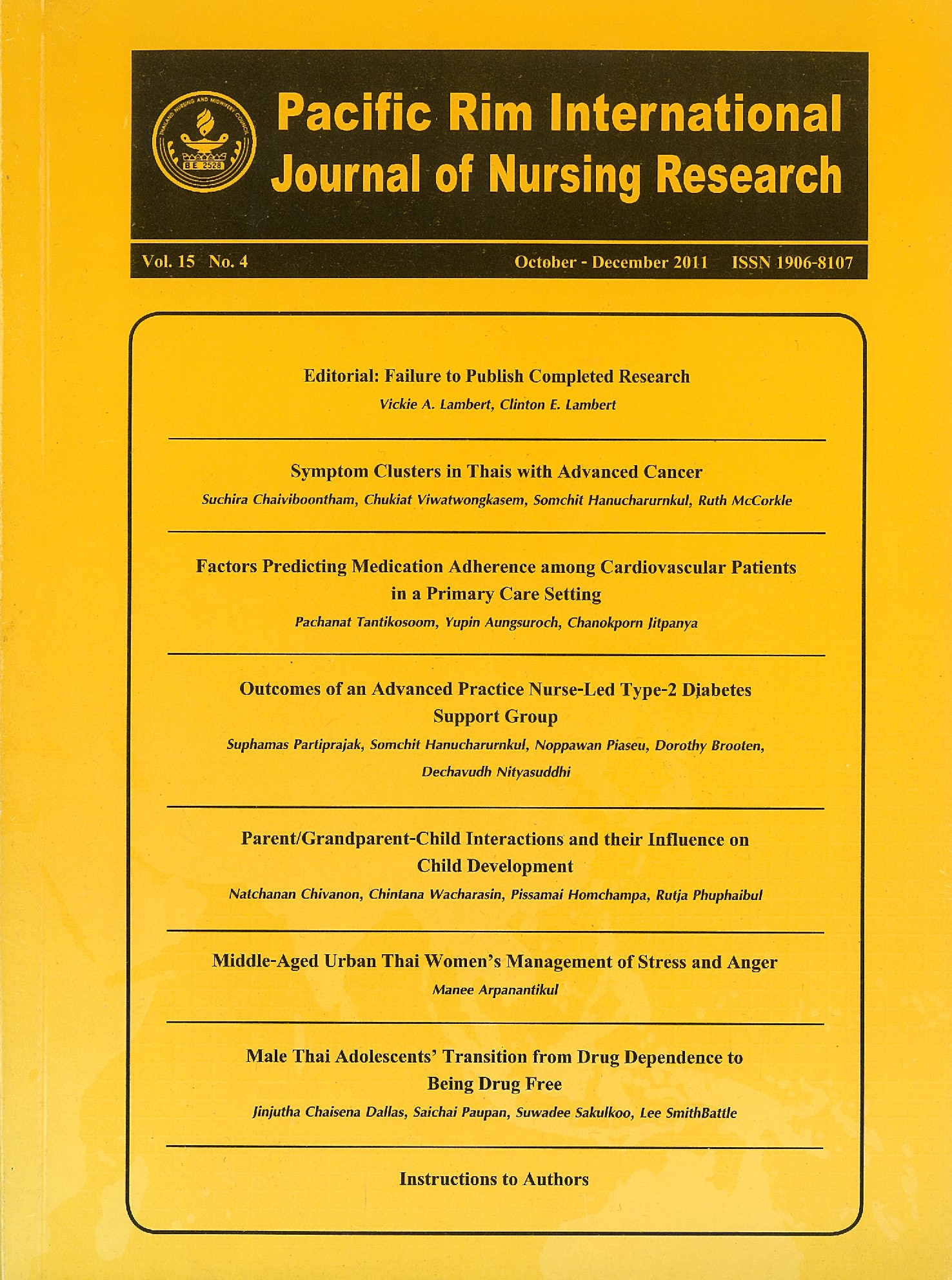Symptom Clusters in Thais with Advanced Cancer
Keywords:
กลุ่มอาการ, มะเร็งระยะลุกลาม, ประสบการณ์อาการ, symptom clusters, advanced cancer, symptom experienceAbstract
บทคัดย่อ
ผู้ป่วยมะเร็งระยะลุกลามมักได้รับความทุกข์ทรมานจากอาการต่างๆ ที่เกิดขึ้นพร้อมกัน ดังนั้นการศึกษาเกี่ยวกับกลุ่มอาการในผู้ป่วยมะเร็งระยะลุกลามจะนำไปสู่การจัดการอาการอย่างมีประสิทธิภาพและส่งผลให้เกิดประโยชน์สูงสุดแก่ผู้ป่วย การศึกษาครั้งนี้มีวัตถุประสงค์เพื่อสำรวจและสกัดกลุ่มอาการในผู้ป่วยมะเร็งระยะลุกลาม กลุ่มตัวอย่างเป็นผู้ป่วยมะเร็งระยะลุกลามจำนวน 240 คนที่มีคุณสมบัติตามเกณฑ์ที่กำหนด จากโรงพยาบาลระดับตติยภูมิสามแห่งในกรุงเทพมหานครและปริมณฑล เครื่องมือที่ใช้ได้แก่ แบบบันทึกข้อมูลส่วนบุคคล และแบบประเมินอาการ โดยเก็บข้อมูล ระหว่างเดือนพฤศจิกายน 2551 ถึง เดือน เมษายน 2552
ผลการศึกษาพบว่ามะเร็งที่พบมากที่สุดคือมะเร็งของระบบทางเดินอาหาร รองลงมาคือ มะเร็งเต้านม มะเร็งของระบบตับและทางเดินน้ำดี มะเร็งปอด ตามลำดับ อาการ ที่มีความชุกสูงสุดคืออาการปวด รองลงมาคือ รู้สึกอึดอัดเหมือนมีลมในท้อง อ่อนเพลีย ไม่มีแรง หายใจไม่อิ่ม มองดูตนเองไม่เหมือนเดิม จากการศึกษาโดยใช้การวิเคราะห์องค์ประกอบเชิงสำรวจเพื่อสกัดกลุ่มอาการพบกลุ่มอาการ 4 กลุ่มคือ 1) pain, sickness-behavior, and psychological, 2) anorexia-cachexia, 3) gastro-intestinal and elimination, and 4) cutaneous and other.
ผลการศึกษาเกี่ยวกับกลุ่มอาการในผู้ป่วยมะเร็งระยะลุกลามในครั้งนี้ ช่วยให้ผู้ให้บริการทางสุขภาพเข้าใจอาการที่เกิดขึ้นพร้อมกัน นำไปสู่การจัดการกับกลุ่มอาการอย่างมีประสิทธิภาพ ซึ่งจะช่วยเพิ่มคุณภาพชีวิตของผู้ป่วยมะเร็งระยะลุกลามต่อไป
คำสำคัญ : กลุ่มอาการ, มะเร็งระยะลุกลาม, ประสบการณ์อาการ
Abstract
Patients with advanced cancer often suffer from multiple concurrent symptoms. Symptom cluster identification may lead to effective symptom management, which can result in improved patient care. The purpose of this study was to explore the cluster of symptoms in Thais with advanced cancer. Two hundred and forty Thai patients with advanced cancer from three tertiary hospitals in Bangkok and the surrounding suburbs were recruited to complete a demographic questionnaire and Memorial Symptom Assessment Scale. Data were collected from November 2008 to April 2009.
The most common cancer reported was gastro-intestinal cancer, followed by breast cancer, hepato-biliary cancer and lung cancer. Pain was the most common symptom, followed by feeling bloated, lack of energy, shortness of breath and “I don’t look like myself.” Using principal component analysis, with varimax rotation, four symptom clusters were identified: “pain, sickness-behavior and psychological;” “anorexia-cachexia;” “gastro-intestinal and elimination;” and, “cutaneous and other.”
The findings should help healthcare providers better understand the concomitant symptoms patients with cancer experience. This knowledge may lead to successful symptom management, reduced medication use and enhanced quality of life for patients with advanced cancer.
Key Words : symptom clusters, advanced cancer, symptom experience
Downloads
How to Cite
Issue
Section
License
Copyright: The Pacific Rim International Journal of Nursing Research, Thailand Nursing & Midwifery Council has exclusive rights to publish, reproduce and distribute the manuscript and all contents therein.








.png)



